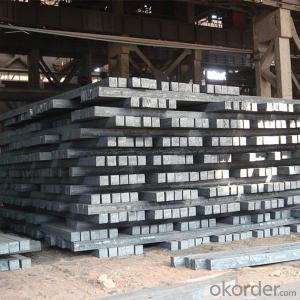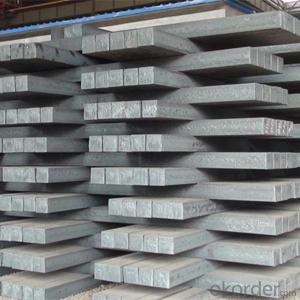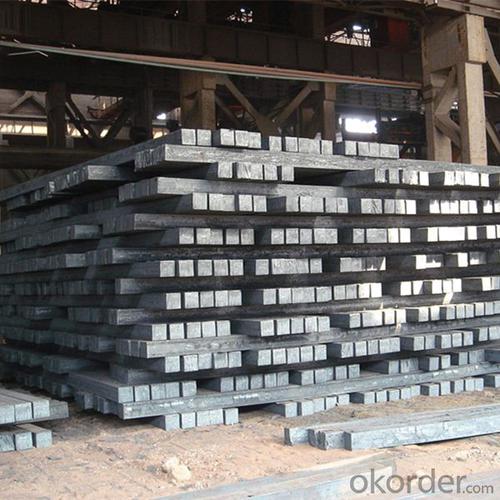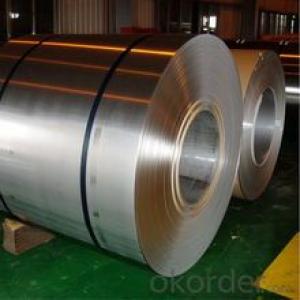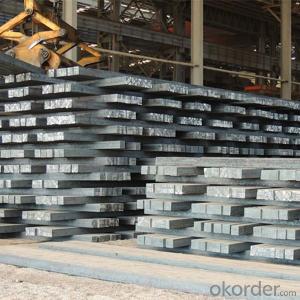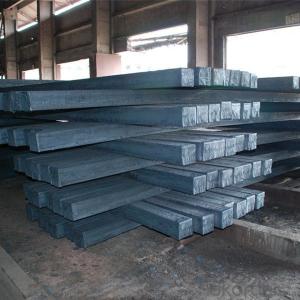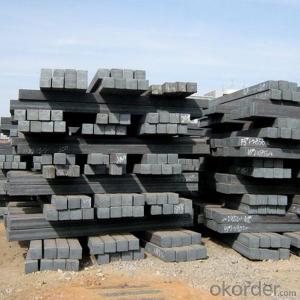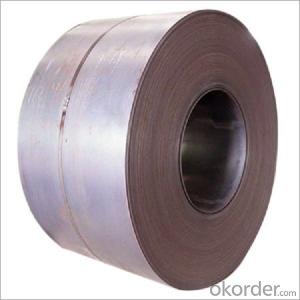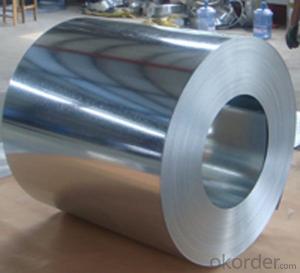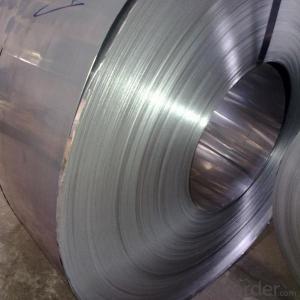Square Bar, Mild Steel Billet From China Manufacturer
- Loading Port:
- China main port
- Payment Terms:
- TT OR LC
- Min Order Qty:
- 1000 m.t.
- Supply Capability:
- 50000 m.t./month
OKorder Service Pledge
Quality Product, Order Online Tracking, Timely Delivery
OKorder Financial Service
Credit Rating, Credit Services, Credit Purchasing
You Might Also Like
Specification
Standard:
GB
Technique:
Hot Rolled
Shape:
Square
Surface Treatment:
Dry
Steel Grade:
Q195,Q215,Q235
Certification:
SGS
Thickness:
60mm-150mm
Width:
60mm-150mm
Length:
6-12m
Net Weight:
23mt
Packaging:
Bare Packing
Square steel billet, square bar, mild steel billet best price from China manufacturer
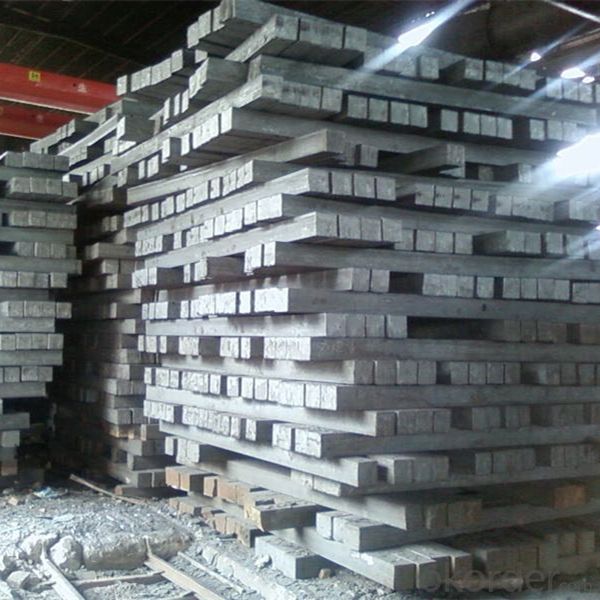
| Name: | Square bar |
| LENGTH: | 6 meter to 12 meter (+ 50mm) |
| Size: | 100*100, 120*120, 150*150, 200*200 |
| Grade: | 3SP,5SP,Q235,20MnSi. |
| Shape: | Square, Round |
| Technique: | Hot-Rolled |
| Standard: | ASTM/GB |
| BENDING | No more than 5mm in 1 meter No more than 30mm in 6 meter No more than 60mm in 12 meter |
| ANGULAR TWIST | No more than 1 degree per meter and not more than 6 degree over 12 meter length. |
| Chemical composition | C, Si, Mn, P, S, N, etc |
Product Description
Chemical Properties
| Size | 60*60/90*90/100*100/120*120/150*150 |
| Length | 6000mm-12000mm |
| Standard | GB |
| Application | To produce bars or other applications |
| Grade | Q195/Q235/Q275/3SP/5SP/20MnSi |
| Packing terms | TT/LC |
| Package | Mill's standard packing or as client's requirement |
| Delivery time | Within 10-30 days after receiving the deposit or LC |
Advantage:
1. Prime quality and competitive pirce
2. Good reputation and large market
3. Big company scale
4. Good service and prompt reply
Shipment:
Logistic department established and serves for sales department. Cargo is delivered to the port by our own trucks. Both bulk and container service are available and cargo shipment is in hands of logistic staffs.
- Q: What is the width range of steel coils?
- The width range of steel coils can vary depending on the specific type and purpose of the coil, but it typically falls within the range of 600 mm (23.6 inches) to 2,200 mm (86.6 inches).
- Q: How are steel coils used in the manufacturing of agricultural implements?
- Steel coils are used in the manufacturing of agricultural implements as they provide strength and durability to the final product. These coils are typically cut, shaped, and welded to create various components such as plows, cultivators, and harrows. The steel coils are an essential material in the construction of these implements, ensuring they can withstand the demanding conditions of agricultural use and effectively perform their intended tasks.
- Q: i know that steel helmets werent meant to stop bullets, but i was wondering do they have an value whatsoever for stopping bullets, or is that just yet another thing that hollywood made up(like the omaha beach scene in saving private rian)
- Steel Pot Helmet
- Q: What are the common size limitations for steel coil production?
- The size limitations for steel coil production can vary based on various factors, including the type of steel used, the manufacturing process, and the available equipment. However, there are generally accepted size limitations in the industry. One primary constraint is the width of the steel coil, which is typically determined by the size of the rolling mill or slitting equipment used in production. Standard widths for steel coil production range from approximately 600 millimeters (23.6 inches) to 2,000 millimeters (78.7 inches). Nonetheless, specialized equipment and processes can achieve widths outside of this range. Another limitation is the thickness of the steel coil, which can be influenced by the type of steel, intended application, and manufacturing capabilities. Common thicknesses for steel coils range from 0.15 millimeters (0.006 inches) to 6 millimeters (0.236 inches). However, specialized equipment and processes may be required to produce thicker or thinner coils. The weight of the steel coil is also an important consideration, typically determined by the capacity of production and handling equipment, as well as transportation limitations. Standard coil weights range from a few hundred kilograms to several tons. However, larger equipment or dividing the coil into smaller coils can enable the production of coils that exceed these limits. In addition to width, thickness, and weight, there may also be limitations on the length of the steel coil. This can be influenced by factors such as the size of the production line, handling and transportation capabilities, and customer requirements. Standard coil lengths typically range from a few meters to several tens of meters. However, specialized equipment and processes can produce longer coils. It is important to note that these size limitations are not fixed and can vary depending on project or customer requirements. Manufacturers often collaborate closely with customers to determine the optimal size limitations for their steel coil production, ensuring the final product meets desired specifications.
- Q: I'm writing a book, and there is a part where there is a death arena with a white-hot river of steel. How hot would that be?
- I had the Odyssey white steel # 5 and absolutly hated it. I gave it away. I didn't like the feel on lag putts. I now putt with a Scotty Cameron Circa 62 #2 and I love it. Would highly recommend a Scotty Cameron for anyone.
- Q: How much do steel coils weigh?
- The weight of steel coils can vary depending on their size and thickness, but on average, they can weigh anywhere from a few hundred pounds to several tons.
- Q: What are the dimensions of steel coils used in bridge construction?
- The dimensions of steel coils utilized in the creation of bridges can fluctuate depending on the precise requirements of the bridge undertaking. However, in general terms, the dimensions of steel coils used in bridge construction typically fall within the range of 0.5 to 1 inch in thickness and 36 to 72 inches in width. The length of the coils may also differ, but is commonly around 20 to 40 feet. These dimensions enable the production of various fundamental structural elements, such as beams, columns, and plates, which are indispensable for bridge construction. It is noteworthy that the dimensions may vary based on the specific design and engineering specifications of the bridge project, as well as the type and load capacity of the bridge being constructed.
- Q: The Iron and Steel Corporation of Great Britain (1949) or Iron and Steel Bill was introduced in 1949 during the Labour post-war Government.What was it introduced for?
- Iron and Steel Bill That would be the Bill to nationalise the Steel industry in UK so that the Socialist Government could destroy it. Britain having won the War against Hitler promptly elected a nasty little Fascist who called himself a socialist Clement Atlee who went and nationalised many key Industries in UK so that the Government could run them. In 1979 British Steel was costing the UK tax payer a ?Million per day to keep running and was on the point of collapse with Steel production declining. Unfortunately it wasn't until Mrs. Thatcher came to power in 1979 that they were later put back into the Public sector and shares in British Steel could be bought by the Public and the Company run by people who knew how to run a steel industry. As a consequence Britain now produces more steel than it has ever done in its History.
- Q: What are the best types of steel for swords
- The okorder /
- Q: What are the common problems encountered with steel coils during production?
- There are several common problems encountered with steel coils during production. One of the most common issues is coil slippage, where the coils shift or slide out of place during handling or transportation. This can result in damage to the coils or pose a safety risk to workers. Another common problem is coil rusting or corrosion. Steel coils are susceptible to rusting if they come into contact with moisture or are not properly protected. Rust can compromise the structural integrity of the coils and lead to product defects or failure. Coil breakage is also a common problem. This occurs when the coils are subjected to excessive stress or tension, causing them to crack or break. Coil breakage can result from improper handling or storage, as well as production issues such as improper rolling or cooling processes. Coil surface defects are another common issue. These defects can include scratches, dents, or uneven surfaces on the coils. Surface defects can compromise the appearance and quality of the final product, making it unsuitable for certain applications. Lastly, coil contamination is a problem that can occur during production. Contaminants such as dirt, oil, or foreign particles can adhere to the surface of the coils, leading to quality issues or difficulties in further processing. Contamination can result from improper handling, inadequate cleaning processes, or poor environmental control. To mitigate these common problems, proper handling and storage practices are essential. This includes using appropriate lifting and transporting equipment, ensuring the coils are stored in a dry and clean environment, and implementing effective rust prevention measures. Regular inspections and quality control checks can also help identify and address any issues early on, preventing further damage and ensuring the production of high-quality steel coils.
Send your message to us
Square Bar, Mild Steel Billet From China Manufacturer
- Loading Port:
- China main port
- Payment Terms:
- TT OR LC
- Min Order Qty:
- 1000 m.t.
- Supply Capability:
- 50000 m.t./month
OKorder Service Pledge
Quality Product, Order Online Tracking, Timely Delivery
OKorder Financial Service
Credit Rating, Credit Services, Credit Purchasing
Similar products
Hot products
Hot Searches
Related keywords
